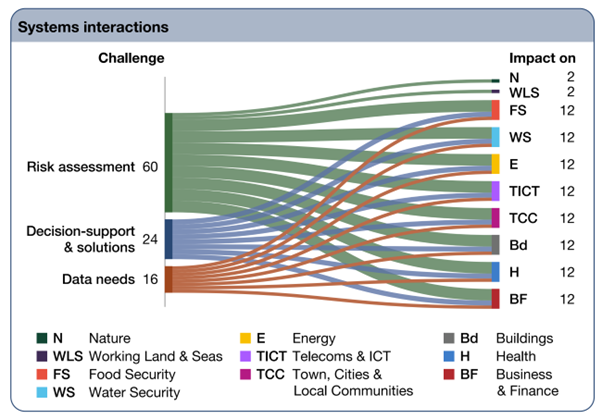

Climate change is already creating a diversity of challenges for all sectors in society, and it is imperative that we continue and improve our efforts of understanding how to better prepare and adapt to the changing conditions. The UK understands this and under the UK Climate Change Act of 2008, the government is required to prepare a UK Climate Change Risk Assessment every five years followed by a National Adaptation Plan. The last ones were published in January 2022 (the third UK Climate Change Risk Assessment (CCRA3)) and in July 2023 (the third National Adaptation Programme).
Join other savvy professionals just like you at CIHT. We are committed to fulfilling your professional development needs throughout your career
By Juan Sebastian Canavera Herrera, PhD MRes MCIHT GMICE
Earlier this year in April, the UK government published a Climate Adaptation Research and Innovation Framework (CARIF) to outline the research and innovation needed around climate adaptation to address the risks and opportunities identified in the CCRA3. The CARIF was developed by the Government Office for Science and the Department for Environment, Food and Rural Affairs and sets out the research and innovation (R&I) challenges for 11 sectors: nature; working land and seas; food security; water supply; energy; telecommunications and ICT; transport; towns and cities and community; preparedness/response; buildings; health; and business and finance.
The framework has been developed having in mind that adapting to climate change in the UK will require R&I investment across the public sector, businesses and research communities. R&I activities are recommended to be prioritised based on how critical they are based on the results of CCRA3, how easily scalable the adaptation solutions are, and the confidence in the cost-effectiveness of the adaptation measures identified. Additionally, since the impacts of climate change are complex, uncertain and dynamic, the CARIF takes a systems approach to suggesting R&I priorities. The framework draws out linkages between adaptation R&I challenges in each sector of the economy and challenges in other sectors. This helps to identify where there might be opportunities to maximise the co-benefits of adaptation across sectors and minimise any unintended consequences of adaptation action in one sector on others.
The framework is expected to be used as a strategic tool to guide R&I agendas within business and research communities. In the next section, the recommendations for the transport sector are presented.
In the Framework, transport infrastructure networks include strategic and local roads, railways, ports and airports. The main goal of the UK’s transport sector according to the Framework is to achieve reliable net zero transport systems. This includes achieving reliability at the asset and system level of the rail network, the strategic road network, the local roads, airport operations, and port operations. Additionally, achieving the main goal requires identifying and managing interdependencies between transport networks and other infrastructure systems. The key UK government department identified by the Framework is the Department for Transport.
The Framework identifies R&I challenges related to risk assessment, decision-support and solutions, and data needs, and their connections or impact on other sectors of the economy. As the figure below shows, for the transport sector, the challenges with more impact in other sectors of the economy are those related to risk assessment.
As expected, climate adaptation challenges in the transport sector have a strong impact on almost all sectors of the economy. Transport infrastructure networks are critical infrastructure for the efficient functioning of other sectors since they allow people, materials and other goods to be able to move safely and promptly to where they are most needed. This emphasises the criticality of overcoming these challenges in the adaptation of transport networks as this can have positive cascading effects in the rest of the economy.

Figure 1. Climate Adaptation R&I Challenges Systems interactions – Transport Sector
Source: UK Government. Climate Adaptation Research and Innovation Framework. April 2025
The Framework identifies the main R&I needs for the transport sector in the UK for each of the R&I challenges (risk assessment, decision-support and solutions, and data needs). The main R&I needs identified are summarised in the following table.
Table 1. Climate Adaptation R&I Needs in the UK’s Transport Sector
Adapted from: UK Government. Climate Adaptation Research and Innovation Framework. April 2025
R&I Challenge |
R&I Needs |
| Risk Assessment |
|
| Decision support and solutions |
|
| Data needs |
|
The Climate Adaptation Research and Innovation Framework (CARIF) demonstrates that there are still many research and innovation challenges and needs in the transport sector in the UK and other economic sectors. These present excellent opportunities for the UK public sector, private sector and research communities to increase their collaboration efforts in order to make our country more prepared and adapted to the new conditions being brought by climate change.
Most of the challenges in the transport sector lie in understanding much better what the potential risks to our infrastructure networks are and the costs of the different adaptation measures that can help our networks cope with climate change. The Chartered Institution of Highways and Transportation (CIHT) has the opportunity to have a role in all these efforts by creating a space for collaboration between its members from the public sector, businesses and research communities.
Challenging times are ahead but they can also be seen as exciting times in which we as transport professionals can find interesting, cost-effective, sustainable and resilient ways of creating reliable net zero transport networks that can take all users safely to their destinations.
The full document of the Climate Adaptation Research and Innovation Framework (CARIF) can be found here: https://www.gov.uk/government/publications/climate-adaptation-research-and-innovation-framework
HM Governnment. April 2025. Climate Adaptation Research and Innovation Framework. URL: https://www.gov.uk/government/publications/climate-adaptation-research-and-innovation-framework
Join other savvy professionals just like you at CIHT. We are committed to fulfilling your professional development needs throughout your career
{{item.AuthorName}} {{item.AuthorName}} says on {{item.DateFormattedString}}: